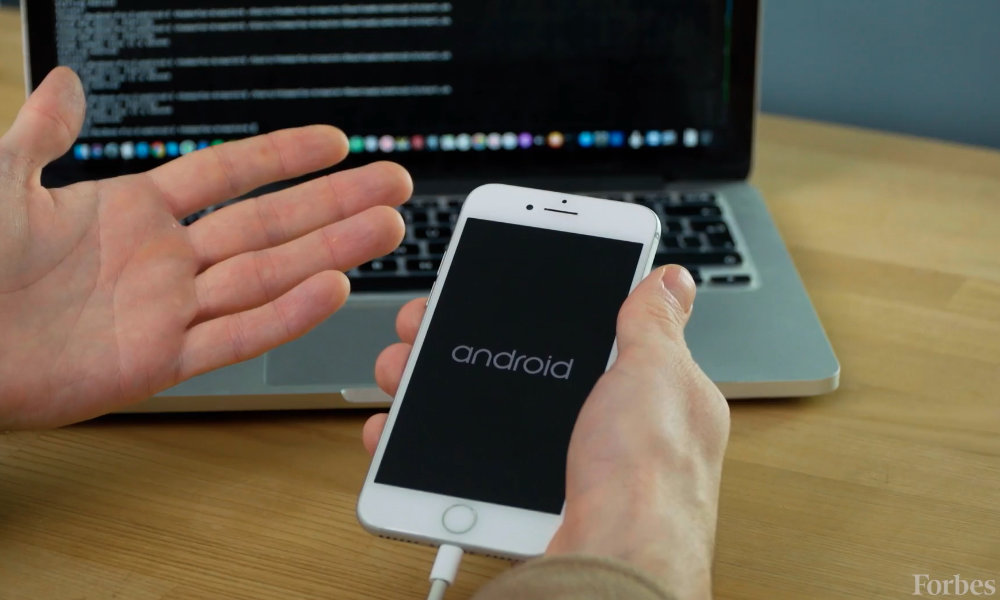You Can Now Run Android on Your iPhone, Thanks to Project Sandcastle
 Credit: Thomas Brewster / Forbes
Credit: Thomas Brewster / Forbes
Toggle Dark Mode
A team of developers have figured out how to do something that’s sure to raise the ire of Apple—installing the Android operating system on iPhone hardware.
While it’s not the first time this has been done—the same developer, David Wang, managed to get Android onto the original iPhone and iPhone 3G ten years ago—it’s definitely a much bigger deal to be able to do it on modern iPhones, which are considerably more secure and inscrutable at the hardware level.
In fact, it seems that this latest accomplishment has only been made possible by the checkm8 bootrom exploit that was discovered last year that renders everything from the iPhone 4S to the iPhone X permanently jailbreakable.
Now, Forbes has an exclusive look at what David Wang and his colleagues have managed to pull off, and to make matters even more scandalous, this is the same team of developers behind Corellium, a company that’s being sued by Apple over claims that it violated Apple’s copyrights by creating software versions of the iPhone for testing purposes. Forbes calls the move “a cheeky potshot at Apple,” and they’re probably right.
Poking Apple in the Eye
Even the name, Project Sandcastle, is intended to evoke how the team is working outside the limits of Apple’s “sandbox,” and in a statement to Forbes, Corellium CEO Amanda Gorton described it as being “about having fun building something new from the sane—from the literal silicon of the hardware,” while also emphasizing that Corellium believes that users “should be able to use [the iPhone] hardware the way they want” rather than dealing with sandboxes that “create limits and boundaries” on the devices that they own.
Correlium’s counsel, David Hecht, also accuses Apple of seeking to “exclude competition … under the guise of security” by locking down the iPhone and iPad. Running Android on iPhone “will finally provide customers with a viable alternative to Apple’s App Store and iOS,” Corellium notes.
So It’s Real?
At this point, the Corellium team has a working version of the Android package for the iPhone 7, iPhone 7 Plus, and the iPod touch, but Corellium’s cofounder Chris Wade says that support for more devices is coming.
That said, it’s unlikely to ever work on newer devices like the iPhone XS, iPhone XR, iPhone 11, and iPhone 11 Pro, since its reliance on checkm8 means it can only be installed on devices that are vulnerable to that bootrom exploit, which is limited to devices using Apple’s A5 through A11 CPUs. Of course, if a new jailbreak is found that works reliably for the A12 and A13 equipped devices, there seems to be no reason that Android couldn’t come to those as well.
If you have an iPhone 7 or iPhone 7 Plus, you can try out a beta of Android for your iPhone right now by visiting ProjectSandcastle.org. While the seventh-generation iPod touch (which still uses an A10 CPU) also appears to be supported, the team hasn’t yet made any builds available for that device.
How Does It Work?
It’s worth noting that Project Sandcastle doesn’t replace whatever iOS version you’re using, but rather installs as a dual-boot system similar to how users can use both macOS and Windows on a Mac via Bootcamp. Of course, while Bootcamp is an Apple-sanctioned feature, what Corellium is doing here is most definitely not.
Forbes notes that it had an opportunity to play around with an iPhone 7 running Android on top of iOS 13.3, saying that “the most compelling addition was encrypted messaging app Signal,” although it’s a bit unclear exactly what they meant by that, since Signal is also available as a native iOS app, they do go on to note that Project Sandcastle makes it possible to create an “ephemeral” phone within the iPhone, where everything that a user does vanishes when the user reboots back to iOS. In this case, users could erase all memory of encrypted calls and messages as soon as they return to using iOS.
Of course, as Forbes points out—and we agree—jailbreaking your iPhone can still be a bad idea, so we wouldn’t recommend this as a road that non-technical users should go down. However, we also think it’s fairly safe to say that if you’re itching to run Android on your iPhone, you’re probably not a typical Apple user in the first place.






